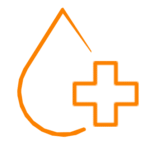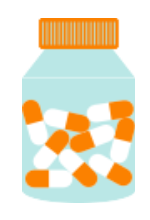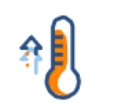Long-Term Care Summer Safety Tips
With summer in full swing, caregivers in long-term care settings must take extra precautions to protect residents from seasonal health risks. July is UV Safety Month—an important reminder of the dangers of sun exposure, particularly for older adults in skilled nursing facilities who may be more susceptible to heat-related illnesses, skin damage, and medication-related complications. Certain medications can increase sensitivity to sunlight or affect hydration levels, making it essential for nursing staff to stay vigilant. In this post, we’re sharing summer safety tips to help care teams keep residents safe, comfortable, and well-protected throughout the warmer months.
 STAY HYDRATED
STAY HYDRATED
Dehydration is a dangerous problem that can easily escalate and lead to several adverse consequences and, even the potential need for hospitalization. Older adults become even more susceptible to dehydration as their sense of thirst and ability to conserve water decreases. The use of certain medications may also increase one’s risk for dehydration including:
- Diuretics
- Laxatives
- Oral Antidiabetic agents
- Lithium
- Fentanyl and Opioid analgesics
When the heat and humidity start to rise, it’s very important to prevent dehydration by maintaining adequate fluid intake.
- Dehydration may increase your risk of developing a heat-related illness.
- If your doctor has told you to limit your liquids, ask what you should do when it is very hot.
- Signs of hyperthermia include dizziness, muscle cramps, edema, rapid pulse, nausea, and weakness.
 CELEBRATE IN MODERATION
CELEBRATE IN MODERATION
During some events taking place this season, there will likely be an opportunity to celebrate or relax with an alcoholic beverage. When having a drink, there are a few extra precautions to keep in mind. Since alcohol is a diuretic, be sure to drink plenty of water before, during, and after to stay adequately hydrated. Drinking alcohol can also impact judgment, making it more difficult to self- recognize symptoms of heat-related illness. It is important to be extra cautious of hypoglycemia since alcohol may not only cause a decrease in blood sugar, but can also mimic common symptoms of hypoglycemia such as dizziness and confusion.
While it may be difficult to impede on one’s decision to enjoy alcohol in moderation, certain situations require intervention to prevent an adverse outcome. If taking a CNS- depressing medication such as a benzodiazepine, muscle relaxant, or opioid, it is important to understand how alcohol may increase these effects. Medications that can interact with alcohol and may cause a reaction resulting in immediate and severe hangover- like symptoms include metronidazole, isosorbide dinitrate, glyburide, nitrofurantoin, and Bactrim. Always be sure to promote responsible drinking and maintain a safe environment whenever alcohol is involved.
 MEDICATION STORAGE
MEDICATION STORAGE
Reinforce proper storage in warm months:
- Avoid leaving medications in hot vehicles or windowsills
- Store in cool, dry areas as directed
- When traveling by plane, be sure to pack your medications in your carry-on luggage
 KEEP YOUR COOL
KEEP YOUR COOL
As the temperature rises, so does the risk of heat-related illnesses and the dangers associated with them. Individuals who may not be able to adjust as well to temperature changes and are most at risk for these illnesses include the elderly, obese, and those who have chronic medical conditions such as cardiac, pulmonary, and psychiatric disorders. One may also be more sensitive to heat stress if taking certain medications such as:
- Antipsychotic agents
- Thyroid hormones
- Medications with anticholinergic effects* (can decrease sweat production)
*Examples include benztropine (Cogentin), scopolamine (Transderm-Scop), oxybutynin (Ditropan)
When temperatures get extreme it is important to stay in air-conditioned areas as much as possible, wear appropriate clothing, and give baths or use cool cloths to cool down
 SHIELD YOUR SKIN
SHIELD YOUR SKIN
To enjoy the outdoor sunshine safely, EVERYONE should wear sunscreen. Even if only going outside for a short time, sunscreen, with an SPF (Sun Protection Factor) of 15 or higher, should be applied liberally one-half hour before heading out, and be sure to reapply often. Wearing sunglasses outdoors is also very important, along with being sure to remove them once inside and taking time to adjust to the diminished light in order to prevent accidents. Taking appropriate precautions and avoiding sun exposure becomes especially important when someone is taking medication that may make them more sensitive or have a reaction to sunlight.
- Common photosensitizing medications include:
- Certain antibiotics (including doxycycline, ciprofloxacin, levofloxacin, Bactrim)
- Diuretics NSAIDs
- Sulfonylureas
- Antidepressants Statins
- Amiodarone
- Many other medications may also contribute towards photosensitivity, making it a good practice to avoid sun exposure whenever possible and to contact your pharmacist if you have any questions regarding a specific medication.
As we move through the heart of summer, it’s important to stay proactive in protecting the health and safety of long-term care residents. By staying vigilant about hydration, managing heat exposure, promoting responsible celebration, storing medications properly, and safeguarding against sun damage—especially when medications may increase risks—care teams can help ensure a safe and comfortable season for everyone. At Remedi SeniorCare, we’re committed to supporting your efforts with the knowledge and tools you need to navigate the unique challenges summer brings.
Selected resources
Clinical Pharmacology powered by ClinicalKey. Philadelphia (PA): Elsevier. c2025- [cited 2025 July 7]. Available from: http://www.clinicalkey.com.
Weathermon R, Crabb DW. Alcohol and medication interactions. Alcohol Res Health. 1999;23(1):40-54. PMID: 10890797; PMCID: PMC6761694.
“Hot Weather Safety for Older Adults.” National Institute on Aging. Web. July 7 2025.
https://www.nia.nih.gov/health/safety/hot-weather-safety-older-adults “Extreme Heat and Your Health.” CDC. Web. 7 July 2025. https://www.cdc.gov/extreme-heat/about/index.html
